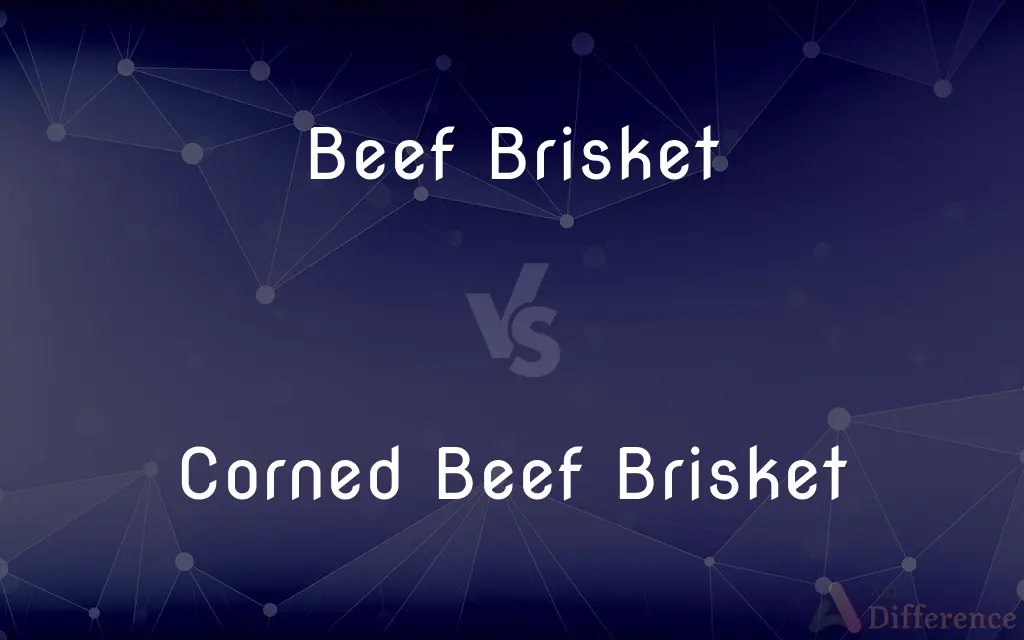Beef Brisket vs. Corned Beef Brisket — What's the Difference?
By Urooj Arif & Fiza Rafique — Published on July 10, 2024
Beef brisket is a tough cut of meat from a cow's chest, slow-cooked to tenderize, while corned beef brisket is beef brisket cured in a brine with spices, known for its salty flavor.

Difference Between Beef Brisket and Corned Beef Brisket
Table of Contents
ADVERTISEMENT
Key Differences
Beef brisket is known for its rich flavor and tough texture, requiring slow cooking methods like smoking or braising to become tender. It's a popular cut for barbecue and traditional roasts. Corned beef brisket, on the other hand, undergoes a curing process in a salt-based brine, often with spices like peppercorns and bay leaves, which gives it a distinctively salty taste and tender texture even before cooking.
Beef brisket can be cooked in various ways, while corned beef is typically boiled or slow-cooked, often served with vegetables like potatoes and cabbage, especially on St. Patrick’s Day in the United States. This preparation highlights the versatility of brisket, transformed through the curing process.
The curing process of corned beef brisket not only changes the flavor profile but also its shelf life and cooking requirements. Cured meat can last longer due to the preservation effects of the salt and spices. However, it usually requires desalination by soaking before cooking to ensure it's not overly salty.
Nutritionally, both cuts are high in proteins and fats, but corned beef has a higher sodium content due to the brining process. This difference makes beef brisket a more versatile ingredient in terms of seasoning and flavoring, as it absorbs spices and marinades without the inherent saltiness of corned beef.
Culturally, beef brisket has a significant place in many cuisines, from American barbecue to Jewish holiday meals. Corned beef, while also enjoyed in Jewish delis as a sandwich meat, is particularly associated with Irish-American cuisine, reflecting the adaptation of immigrants to the ingredients available in the United States.
ADVERTISEMENT
Comparison Chart
Preparation
Slow-cooked (smoked, braised)
Brined, then boiled or slow-cooked
Flavor
Rich, meaty
Salty, spiced
Texture
Tough, becomes tender with cooking
Tenderized by brining
Common Uses
Barbecue, roasts
St. Patrick’s Day meals, sandwiches
Nutritional Content
High in protein and fat
High in protein, fat, and sodium
Compare with Definitions
Beef Brisket
Popular in barbecue cuisine.
Beef brisket is a staple at Texas BBQ joints.
Corned Beef Brisket
Essential for St. Patrick’s Day meals.
Corned beef brisket is a tradition on St. Patrick’s Day.
Beef Brisket
Versatile in cooking applications.
The chef marinated the beef brisket before roasting it.
Corned Beef Brisket
Known for its salty, spiced flavor.
The corned beef brisket had a perfect balance of spices.
Beef Brisket
Requires long, slow cooking methods.
The beef brisket was braised until tender.
Corned Beef Brisket
Commonly boiled with vegetables.
They served the corned beef brisket with cabbage and potatoes.
Beef Brisket
A tough cut from the lower chest of beef.
They slow-smoked the beef brisket for twelve hours.
Corned Beef Brisket
Beef brisket cured in a salt-based brine.
The corned beef brisket soaked overnight before cooking.
Beef Brisket
Prized for its rich flavor.
The beef brisket had a deep, meaty taste.
Corned Beef Brisket
Requires desalination before cooking.
The corned beef brisket was soaked to remove excess salt.
Common Curiosities
Can you barbecue corned beef brisket like regular beef brisket?
While possible, corned beef brisket is typically boiled or slow-cooked due to its curing process.
How do you cook beef brisket to make it tender?
Slow cooking methods like smoking or braising are used to tenderize beef brisket.
Is one healthier than the other?
Beef brisket and corned beef brisket are similar in protein and fat, but corned beef has significantly more sodium.
Why is corned beef brisket associated with St. Patrick’s Day?
Corned beef brisket became associated with Irish-American cuisine and is traditionally eaten on St. Patrick’s Day.
What are the origins of corned beef?
Corned beef's origins trace back to Ireland, but it became popular in the United States among Irish immigrants.
Can beef brisket be used in place of corned beef brisket for traditional dishes?
While they can be substituted in recipes, the flavor and texture will differ due to the curing process of corned beef.
Is beef brisket expensive?
The price of beef brisket can vary, but it's generally considered a more affordable cut compared to others.
Can corned beef brisket be made from other cuts of beef?
While possible, the brisket is preferred for its fat content and texture.
What makes beef brisket different from corned beef brisket?
Beef brisket is a raw cut of meat, while corned beef brisket is cured in a brine solution with spices.
How long does it take to cook a beef brisket?
Cooking times vary, but beef brisket generally requires several hours of slow cooking to become tender.
How should corned beef brisket be stored before cooking?
It should be kept in the refrigerator, within its brine, until ready to cook.
Why does corned beef need to be soaked before cooking?
Soaking removes excess salt from the curing process, preventing the dish from being overly salty.
What spices are used in corned beef brisket?
Common spices include peppercorns, bay leaves, and mustard seeds.
Why is beef brisket so popular in barbecue?
Its tough texture becomes tender and flavorful when slow-cooked, making it ideal for smoking and barbecuing.
What does "corned" in corned beef brisket refer to?
"Corned" refers to the large grains of salt (corns) used in the curing process.
Share Your Discovery

Previous Comparison
Recursion vs. Iteration
Next Comparison
Dug Well vs. Drilled WellAuthor Spotlight
Written by
Urooj ArifUrooj is a skilled content writer at Ask Difference, known for her exceptional ability to simplify complex topics into engaging and informative content. With a passion for research and a flair for clear, concise writing, she consistently delivers articles that resonate with our diverse audience.
Co-written by
Fiza RafiqueFiza Rafique is a skilled content writer at AskDifference.com, where she meticulously refines and enhances written pieces. Drawing from her vast editorial expertise, Fiza ensures clarity, accuracy, and precision in every article. Passionate about language, she continually seeks to elevate the quality of content for readers worldwide.











































